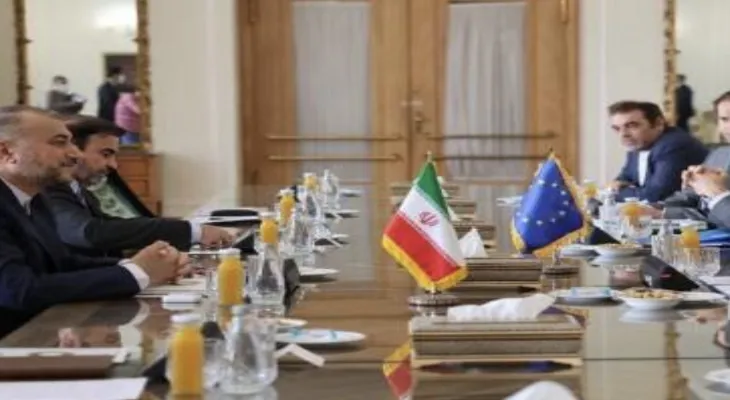Search here
Newspaper
Search here

Arab Canada News
News

Published: August 20, 2022
Israeli media outlets reported today, Saturday, quoting Israeli Deputy Defense Minister Alon Schuster, saying that "the emerging nuclear agreement with Iran, it seems, will be worse than the agreement that Netanyahu encouraged Trump to withdraw from."
The Deputy Defense Minister said in a statement to the Israeli "Channel 12" that "officials in the security establishment are worried about the current reality," adding: "We are not part of the agreement, and we will use the time to prepare important military options."
The Israeli official added, "We will not rely on international agreements, but will monitor the reality on the ground, and work with our partners to prevent Iran from possessing nuclear capabilities."
The head of the Israeli occupation government, Yair Lapid, had previously said that "the nuclear agreement, which is emerging with Iran, is worse than the previous agreement."
"The issue of sanctions is not important"
In turn, retired Brigadier General Tamir Hayman said that "the issue of removing the Revolutionary Guard from the terrorism list was never a red line, or something that cannot be relinquished."
He noted that "the issue of sanctions is not important; rather, it is more symbolic," indicating that "sanctions were imposed on the Revolutionary Guard before it was added to the terrorism list, and they will continue."
Today, Iranian negotiating delegation advisor Mohammad Marandi denied what the American network "CNN" published, which stated that "removing the Revolutionary Guard from the American terrorism lists was an Iranian condition during the nuclear negotiations."
Marandi told Al Mayadeen that "removal of the Revolutionary Guard from the American terrorism lists was not a condition in the Vienna talks."
"There is no effective military option"
"Channel 12" pointed out that "there is no effective military option against Iran's nuclear program," stressing "the necessity for Israel to start thinking about living under a nuclear Iran."
It added that "Israel cannot currently influence the agreement, as the United States wants to return to it," explaining that "if what leaked externally is related to the technological field, then that is worrying. And Iran has made several achievements, especially after the (American) withdrawal from the agreement and its return, there is a price to be paid (to Iran)."
The channel feared that Iran owns quantities of uranium "which it can, tomorrow morning, if it wishes, enrich to a military level," considering that "this is a dangerous situation for Israel, which has no answer to it."
It said, "The game is over, and Israel in all its attempts is still running in place," adding that "a group of people connected to military preparations for a possible attack on Iran in 2011 say today that there is no possibility for an effective military operation."
Israeli concerns
Two days ago, the Israeli occupation government conveyed a message to the American administration, stating that "the draft European Union agreement, which is being discussed with Iran, exceeds the boundaries of the nuclear agreement signed in 2015, and does not align with the Biden administration's red lines."
Israeli media had quoted political sources saying that "Iran is approaching signing the nuclear agreement," and that "Israel sees the current agreement as a bad agreement," noting that it "is preparing for multiple grand scenarios."
Amir Bokhbot, the military affairs commentator on the Israeli "Walla" website, said that "Israel will not sit quietly in light of the developments in the negotiations between Iran and the United States regarding the nuclear project," adding that "the assessment is that a conflict over the nuclear agreement between the United States and Israel will begin soon. And even if there is an effort to keep it behind the scenes, it will slip out."
A new stage
For his part, Iranian Foreign Minister Hossein Amir-Abdollahian said that his country will enter a new stage of the Vienna negotiations after receiving Washington’s response to its proposals regarding the nuclear agreement, conditioning this on "guaranteeing Iran's economic benefits, and considering its red lines."
This comes after Iran responded to the "final text" presented by the European Union regarding the nuclear agreement. Iranian Foreign Minister Hossein Amir-Abdollahian called on Washington to show flexibility to revive the 2015 agreement.
The spokesperson for the US State Department, Ned Price, later confirmed that the United States will continue to study what Iran has presented, adding: "We are consulting on this matter with our European partners." The European Commission, for its part, announced that the European Union is studying Iran's response to the "final text" about the nuclear agreement, and that the Union is consulting partners on the matter.
Russia's representative to international organizations, Mikhail Ulyanov, described Iran's response to the European proposal as "constructive," and said that "the ball is now in Washington's court"
Comments